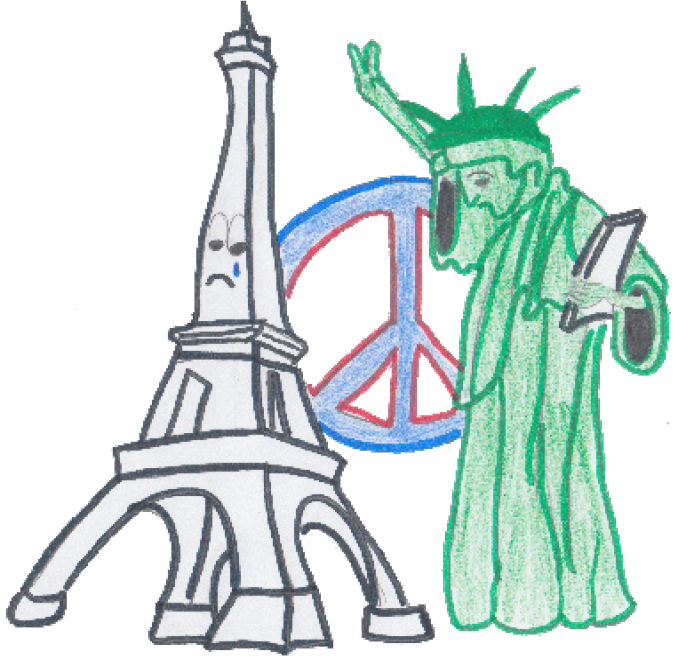On November 13th, Paris, France was made victim to a devastating number of attacks that left more than 120 innocent civilians dead and a nation stricken with grief. The Islamic state, also known as ISIS or ISIL, has publicly claimed responsibility for the deadly acts of terrorism. The worst European terrorist attack in over eleven years, three ISIS units launched catastrophic attacks on six separate locations in Paris.

The ambush shooting at the Bataclan Concert Hall, when three terrorists arrived with assault rifles and opened fire, resulted in close to 90 fatalities.
In the Stade de France, at least three people were killed as a result of the explosions caused by suicide bombers. In addition, there were several fatal shootings around a variety of restaurants, bars, and cafes in the tenth and eleventh districts of Paris. Within minutes of one another, 15 victims were left dead as gunmen attacked an area outside of Paris restaurant Le Petit Cambodge, and other attackers killed up to five people outside of Cafe Bonne Piere. Shortly after, attackers launched a final mass shooting on a restaurant called La Bella Equipe — the cause of 19 more deaths.
“It was very surreal to be in Paris at that time,” said alum Michael Beit ’15, who has been in the city on a gap year. On the 13th, he and another Deerfield graduate, Binger Shanguan ’15, had been having dinner at a tiny Italian restaurant. It was late, and they were the last ones there. The chef came out and asked where they lived, warning them that they might have a hard time getting home that night. After checking the news on their phones, the two soon found out why.
Beit noted that “the news reported a lot of things incorrectly” during the mounting hysteria and confusion of that night. Subways were closed, there were no taxis—everyone walked home through the darkness in the City of Light.
“Everything happened in a very French part of the city, while the Parisians were doing exactly what regular Parisians do on a weekend: drinking, socializing. That definitely scared a lot of people. It was quite literally an attack on their regular way of life,” Beit said. “It’s scary, because I could have very easily made an earlier dinner reservation, finished early, and gone to one of the local brasseries.”
Following November 13th, the world has reacted with support. International tributes and respects have been paid to those affected by the attacks. Tendayi Peyton ’17, a student on SYA France, described the candles, flowers, and drawings arrayed around the French Parliament as “both devastating and beautiful.”
Further evidence of strength throughout France is apparent in less tangible ways.
Despite the presence of grief and shock, Peyton noted the remarkable normality with which the French have carried on: “They live their lives as they were. They are not afraid.”
Yet effects of the tragedy exist in other forms. Francoise Ellis, a Deerfield French teacher on sabbatical in France, commented on the decrease in tourism: “Hotels, restaurants, stores, and other sectors of the economic life of the country have really been touched.” There are questions among the citizens of France that Ellis predicts “will come out to play in the important regional elections in the coming weeks.”
As it has done for many global issues, social media has played a role in bringing attention and awareness to the attacks on Paris. In this day and age, the Internet and popular websites such as Facebook and Twitter can be powerful vehicles for showing support, sharing news, and provoking discussion.
A French citizen named Antoine Leiris, who lost his wife in the shooting of Bataclan, posted a video directed at the terrorists who took her life. Staring at the camera, he defiantly said, “You want me to be afraid, to cast a mistrustful eye on my fellow citizens, to sacrifice my freedom for security. You have lost.”
Sevrin Sarachek ’17, who has family ties to France, discussed the importance of how we use our words during times like these, insisting how “you have to mention specifically ISIS [as the perpetrators], instead of blaming one religion for these tragedies—because than you’re just creating destructive islamophobia.”
The Deerfield community promotes ongoing discussion and students are encouraged to approach the challenging questions that present themselves each day, from smaller scale issues on campus to significant events in the world. Sarachek added how crucial it is for us to be informed in order to “form knowledgeable opinions” about these situations, and Mr. Van Eps, a Deerfield music teacher who’d been performing in France this past month, additionally cited raising awareness in our community as absolutely critical. “To address issues without censorship is the first tool in helping students effectively understand and pursue major worldwide causes and concerns,” he said.

